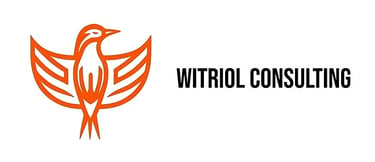The Importance of Finding a Mentor: A Guide for Aspiring Leaders and Professionals
In the fast-paced, ever-evolving world of business, one of the most powerful tools at your disposal is the guidance of a mentor. While skills, knowledge, and experience are critical to success, having a mentor to teach, train, and be there to answer your questions can significantly accelerate your personal and professional development. Whether you’re an aspiring leader, an entrepreneur, or a seasoned professional, a mentor can provide invaluable insights, support, and opportunities that are difficult to attain on your own. This blog explores the importance of finding a mentor and how it can shape your career and contribute to your long-term success.
ORGANIZATIONMANAGEMENT CONSULTINGMERGERSCONSULTINGPARTNERSHIPSSTRATEGYMENTORLEADERSTRAININGLEADERSHIPMENTORSHIPSUCCESS
Shaun Witriol
8/17/20245 min read


The Importance of Finding a Mentor: A Guide for Aspiring Leaders and Professionals
In the fast-paced, ever-evolving world of business, one of the most powerful tools at your disposal is the guidance of a mentor. While skills, knowledge, and experience are critical to success, having a mentor to teach, train, and be there to answer your questions can significantly accelerate your personal and professional development. Whether you’re an aspiring leader, an entrepreneur, or a seasoned professional, a mentor can provide invaluable insights, support, and opportunities that are difficult to attain on your own. This blog explores the importance of finding a mentor and how it can shape your career and contribute to your long-term success.
The Role of a Mentor
A mentor is someone who offers advice, shares knowledge and provides guidance based on their own experiences. Mentors come from various backgrounds and industries, but they share a common goal: to help their mentees grow, develop, and achieve their full potential. The relationship between a mentor and mentee is built on trust, respect, and mutual commitment, making it one of the most meaningful connections in one’s professional journey.
Mentorship can take many forms, ranging from formal mentoring programs within organizations to informal relationships developed through networking. Regardless of the structure, the essence of mentorship lies in its ability to provide tailored, personalized support that addresses the unique challenges and goals of the mentee.
Why Finding a Mentor is Crucial
Accelerated Learning and Development
One of the most significant benefits of having a mentor is the opportunity for accelerated learning. In the business world, knowledge is power, and the ability to quickly acquire new skills and insights can set you apart from your peers. A mentor can help you navigate the complexities of your industry, offering lessons that they’ve learned through years of experience. This kind of learning is not just about acquiring technical skills or industry knowledge; it’s also about understanding the nuances of leadership, decision-making, and strategic thinking.
For example, a mentor can guide you through the process of making tough decisions, helping you weigh the pros and cons and consider the long-term implications. They can also share their experiences with managing teams, dealing with conflict, or driving innovation, providing you with practical examples that you can apply to your own work. This type of experiential learning is invaluable and often more impactful than what you might learn in a classroom or from a textbook.
Building Confidence and Overcoming Challenges
The journey to success is rarely a straight path. It’s filled with challenges, setbacks, and moments of doubt. Having a mentor by your side can make a world of difference during these times. A mentor provides a safe space to discuss your fears, uncertainties, and the obstacles you face. They offer encouragement and perspective, helping you to see challenges as opportunities for growth rather than insurmountable barriers.
Mentors also play a crucial role in building your confidence. They can help you recognize your strengths, develop your leadership style, and trust in your abilities. This is particularly important in leadership roles, where confidence is key to making decisions, inspiring others, and driving change. With a mentor’s guidance, you can approach challenges with a sense of resilience and determination, knowing that you have someone in your corner who believes in your potential.
Expanding Your Network and Opportunities
In the business world, who you know can be just as important as what you know. A mentor can open doors to new opportunities by expanding your professional network. They can introduce you to key industry players, recommend you for positions, or invite you to events where you can connect with other professionals. This expanded network can lead to new career opportunities, partnerships, or collaborations that you might not have accessed on your own.
Moreover, a mentor’s endorsement can carry significant weight. When someone with experience and credibility vouches for your abilities, it can boost your reputation and credibility within your industry. This kind of advocacy can be especially beneficial if you’re looking to advance within your organization, switch careers, or start your own business.
Personalized Guidance and Support
One of the most valuable aspects of mentorship is the personalized guidance and support that mentors provide. Unlike generic advice or one-size-fits-all training programs, a mentor tailors their guidance to your specific needs, goals, and challenges. They take the time to understand your strengths, weaknesses, aspirations, and fears, offering advice that is directly relevant to your situation.
This personalized approach can be particularly beneficial when navigating complex or sensitive situations, such as negotiating a salary increase, managing a difficult team member, or making a major career transition. A mentor can help you consider all the factors, weigh the potential outcomes, and develop a strategy that aligns with your long-term goals. This level of support can be a game-changer, providing you with the clarity and confidence you need to make informed decisions.
Long-Term Career Development
Mentorship is not just about short-term gains; it’s about long-term career development. A mentor helps you think strategically about your career path, setting you up for success in the years to come. They can assist you in identifying your career goals, developing a plan to achieve them, and staying on track as you progress.
For instance, if your goal is to become a C-level executive, a mentor who has already walked that path can provide invaluable insights into the skills, experiences, and relationships you need to cultivate. They can also help you navigate the challenges and politics that often come with higher-level positions, offering advice on how to position yourself for leadership roles and how to manage the expectations that come with them.
Accountability and Motivation
A mentor also serves as a source of accountability and motivation. They hold you accountable to your goals, helping you stay focused and committed even when the going gets tough. This accountability can be a powerful motivator, pushing you to go the extra mile, take risks, and step outside your comfort zone.
Additionally, a mentor’s belief in your potential can be incredibly motivating. Knowing that someone with experience and insight sees value in your abilities can boost your self-esteem and drive you to achieve more than you might have thought possible. This kind of support can be particularly valuable when facing setbacks or when your confidence is shaken.
Finding the Right Mentor
While the benefits of mentorship are clear, finding the right mentor is crucial to maximizing these benefits. The ideal mentor is someone who has the experience, skills, and knowledge that align with your career goals. They should also be someone you respect and trust, and with whom you can build a strong, open, and honest relationship.
Start by identifying potential mentors within your industry or organization. Look for individuals who have achieved the level of success you aspire to and who have a track record of helping others succeed. Don’t be afraid to reach out and ask for their mentorship; many successful professionals are eager to give back and help the next generation of leaders.
Once you’ve identified a potential mentor, approach them with a clear sense of what you hope to gain from the relationship and how you plan to contribute. Remember, mentorship is a two-way street; while your mentor will provide guidance and support, you should also be prepared to show initiative, ask thoughtful questions, and respect their time.
Conclusion
In a world where the pace of change is accelerating, the guidance and support of a mentor can be a powerful catalyst for personal and professional growth. Whether you’re navigating the early stages of your career, striving to reach new heights, or simply seeking to refine your leadership skills, a mentor can provide the insights, encouragement, and opportunities you need to succeed.
As an executive consultant, I’ve seen firsthand the transformative impact that mentorship can have on individuals and organizations alike. The journey to success is challenging, but with the right mentor by your side, you can navigate it with confidence, clarity, and purpose. So, take the initiative to find a mentor who aligns with your goals, invest in the relationship, and embrace the invaluable learning opportunities it brings. Your future self will thank you.
Current Certifications
Small Local Business Enterprise (SLBE) - (San Diego)
Local Small Business Enterprise - (LSBE) - (Los Angeles)
Minority Owned Business (MBE) - (San Diego and Los Angeles, Federal)
Small Business (Micro) - (California)
Disadvantaged Business Enterprise - (California, Arizona, Oregon, Hawaii)
Small Disadvantaged Business - (Federal)
Asian Pacific Business Enterprise - (Federal)
Pending Certifications
8a - (Federal)
© 2024. All rights reserved.


certifications
consultations
